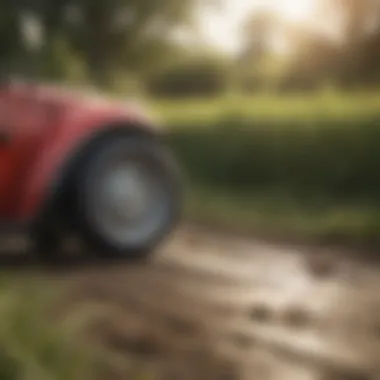Exploring Dominion in Eco-Pest Management


Intro
The concept of dominion over pests has become increasingly significant in the discourse surrounding pest management. It is essential to probe this idea, particularly because our approach to pests influences not just our homes but also the ecological systems we inhabit. Pest management is not merely a matter of eradicating unwanted insects or animals; it encompasses ethical considerations that reflect our values toward the environment and the creatures sharing it with us.
In the following sections, we will examine various aspects of pest control—including identification, prevention strategies, and control methods—while keeping in mind the relationship of dominion. The aim is to offer insights and practices for homeowners and housewives, promoting a thoughtful approach to pest management that respects both the environment and human needs.
Understanding the Pest
Understanding the specifics of pests is vital in devising effective management strategies.
Identification
The first step in any pest management strategy is accurate identification. Recognizing the pest involved is crucial because different species may require distinct approaches. For instance, ants, cockroaches, and spiders all exhibit unique behaviors and survival strategies. Homeowners should invest time in observing these creatures, as knowing what they are dealing with lays the groundwork for an effective management plan.
Life Cycle
Understanding the life cycle of pests also plays a critical role. Many pests undergo multiple stages of development, and their vulnerabilities can vary at different stages. For example, knowing when a particular insect is in its larval stage can limit the effectiveness of certain control methods. Various online resources, such as Wikipedia and Britannica, provide detailed information on the life cycles of common pests.
Pest Prevention Strategies
Prevention is always better than cure when it comes to pest control. Effective prevention strategies are respectful of the pest's role in the ecosystem while minimizing conflicts with human habitats.
Environment Modification
Landscape and home environment modification are key elements in pest prevention. Simple actions such as sealing cracks, ensuring proper drainage, and managing food waste can create less inviting conditions for pests. This preventive measure not only benefits the homeowner but it acknowledges the need to coexist with nature.
Physical Barriers
Another strategy is the implementation of physical barriers. Installing screens on windows, using proper seals on doors, and applying mesh over vents can serve as effective deterrents. These methods help prevent entry without resorting to harmful chemicals.
Control Methods
When prevention fails, various control methods can be employed. Each approach should reflect a balance between effectiveness and environmental responsibility.
Chemical Control
Chemical treatments can be effective but should be approached with caution. Homeowners must consider the impact of such chemicals on non-target species and the broader environment. It is important to choose products that are equally effective against the pests in question and are less resilient to harm the surrounding ecological balance.
Biological Control
An alternative to chemical options is biological control. This approach utilizes natural predators to help regulate pest populations. For instance, introducing ladybugs can mitigate aphid infestations. This method aligns with eco-pest management by promoting balance rather than dominance over the ecosystem.
Using biological control not only suppresses pest populations but also invites a harmonious relationship with nature.
The interplay of dominion with pest management is intricate. By understanding pests, implementing various prevention strategies, and carefully choosing control methods, we pave the way to a more ethical and sustainable approach to pest management that serves both human needs and ecological integrity.
Understanding Dominion
The concept of dominion holds significant weight in ecological studies, particularly in the realm of pest management. Understanding dominion is not merely an academic endeavor; it affects practical approaches to managing pest populations and reflects ethical contours in human-environment interactions. The term itself invokes notions of control and influence, which resonate deeply in agricultural practices and household management.
Definition of Dominion
Dominion generally refers to the authority or control one has over something. In the context of pest management, it signifies the relationship humans assume over pests and insects deemed undesirable or problematic. This authority is historically rooted but has evolved considerably over time. Understanding its definition is crucial for comprehending its implications for environmental management strategies and ethical considerations.
The word dominion derives from Latin, where it conveys autonomy and governance. Within pest management, dominion implies a proactive stance toward controlling pest populations while acknowledging the surrounding ecological context. This duality becomes vital when contemplating sustainable practices within agriculture and our homes.
Historical Perspectives on Dominion
Examining historical perspectives provides context to the contemporary understanding of dominion in pest management. Traditionally, dominion has been intertwined with ideas of dominion theology, which posits that humanity holds a special place in the universe, marked by stewardship over nature. Early agriculturalists approached pest control with methods that reflected their understanding of domination over pests, often viewing them simply as adversaries that needed to be eradicated.
Over centuries, approaches shifted from heavy-handed tactics towards integrated practices. There’s a marked contrast in attitudes during various historical periods. For example, the industrial revolution emphasized chemical interventions to restore productivity, often neglecting long-term ecological consequences. Today, there is a growing awareness of historical mistakes, prompting a re-evaluation of our relationships with the pests and the ecosystems they inhabit.


Modern Interpretations of Dominion
In modern discourse, interpretations of dominion range from authoritarian to cooperative perspectives. Instead of viewing dominion solely as control, many advocates suggest a more reciprocal relationship with nature. This has led to the exploration of integrated pest management (IPM) practices, which leverage an understanding of pest behaviors and ecological balance to minimize harm while maintaining agricultural productivity.
Modern interpretations emphasize ethical considerations. Human impact on ecosystems prompts a need to redefine dominion in ways that account for biodiversity and environmental sustainability. Public debates regarding genetically modified organisms (GMOs) and chemical pesticides highlight shifting viewpoints. Critics advocate for a balance approach where dominion evolves into stewardship, which respects ecological complexities rather than imposing absolute control.
Understanding dominion today encourages a shift toward collaborative practices that align with ecological sustainability and ethical responsibility. This evolution can lead to more effective and sustainable pest management strategies.
Dominion and Pest Management
Dominion in the context of pest management explores how humans exercise control over pest species and their environmental impacts. This concept is pivotal for understanding agricultural practices and the ethical implications involved in pest control.
Using principles of dominion responsibly fosters a holistic relationship with nature. It allows the integration of effective pest management techniques that do not compromise ecological balance. The notion emphasizes accountability in managing pest populations, as well as respect for biodiversity.
Dominion in Agricultural Practices
In agriculture, dominion shapes various practices to manage pests while maximizing crop yields. Farmers must decide how much control to exert over pest populations. This often influences the choice of pest management strategies. Some rely on traditional chemical solutions, while others lean towards integrated pest management (IPM) techniques that combine biological and cultural practices with reduced chemical use.
The adoption of sustainable practices may lead to the following benefits:
- Reduced environmental impact
- Preservation of beneficial insect populations
- Improved crop health and productivity
Understanding dominion influences decision-making in agriculture, allowing farmers to balance human needs with ecological integrity.
Impact on Pest Control Approaches
How dominion is perceived directly affects pest control methods used by both professionals and homeowners. A strong sense of dominion may encourage the use of aggressive chemical pesticides. Conversely, a balanced perspective might promote safer alternatives, such as botanical insecticides or biological controls.
The implementation of eco-friendly approaches is on the rise, driven by public awareness about environmental issues. Alternatives include:
- Natural predators like ladybugs for aphid control
- Traps for reducing rodent populations
- Companion planting techniques to deter pests
These methods reflect a shift towards more sustainable pest management, harnessing natural processes rather than relying solely on chemicals.
Case Studies of Dominion in Action
Various case studies illustrate the concept of dominion applied to pest management. For instance, the use of neem oil in India demonstrates a successful natural pesticide derived from the neem tree. Farmers deploying neem oil have experienced reduced pest populations without harming beneficial insects, showcasing the effectiveness of eco-friendly methods.
Another notable example is the introduction of the Cotesia wasp to control caterpillar pests in Kentucky. This biological control method emphasizes responsible management—exercising dominion through enhanced biodiversity rather than unilateral extermination.
The exploration of these case studies reveals the potential of integrating dominion with ecological awareness, encouraging practices that acknowledge the interconnectedness of life within ecosystems.
"A responsible approach to dominion fosters a sustainable balance in pest management, minimizing harm while ensuring agricultural productivity."
Ecological Considerations of Dominion
The concept of dominion carries significant weight in ecological discussion, especially regarding pest management. Understanding this aspect helps in forming a balance between human intervention and natural processes. As dominion relates to our role in the ecosystem, it becomes crucial to examine how our actions impact not only pests but also the broader environment. Eco-pest management strategies must integrate these considerations to promote sustainability and respect for biodiversity.
Biodiversity and Its Importance
Biodiversity is the variety of life forms in a given ecosystem. This variety is essential for ecosystem stability and resilience. When discussing dominion, one must recognize how human activities can threaten biodiversity. Practices such as monoculture farming can lead to the decline of certain species, which in turn affects pest control. A rich ecosystem with various species allows for natural pest control, as predators can manage pest populations without the need for harmful chemicals.
Key Benefits of Biodiversity in Pest Management:
- Natural Pest Controllers: Birds, insects, and other organisms contribute to pest population management.
- Ecosystem Resilience: Diverse ecosystems are more resilient to pests and diseases.
- Environmental Stability: Healthy biodiversity contributes to nutrient cycling and soil health, reducing the need for artificial inputs.
By promoting biodiversity, we reinforce the ecology's natural mechanisms, reducing the reliance on synthetic pesticides and aligning with the ethical considerations of dominion.
Ethical Implications of Dominion
Dominion carries ethical weight, especially regarding how we treat non-human organisms. The perspective that humans have the right to control and manage pests often leads to practices that overlook animal welfare and ecological integrity. Are we prioritizing our convenience over the rights of other creatures?
This line of questioning raises important ethical considerations:


- Moral Responsibility: We have a duty to consider the impact of our pest management practices on other living beings.
- Sustainable Practices: Ethical domination does not mean eradication but rather management that respects ecological balance.
- Interconnectedness: Recognizing that all species play a role in the ecosystem fosters a more compassionate approach to pest management.
Ultimately, ethical dominion emphasizes stewardship over exploitation, encouraging practices that protect both human and non-human life.
Balance Between Control and Care
Striking a balance between control and care is vital in pest management. This concept suggests that while it is reasonable to manage pests, it must be done in a way that respects the entire ecosystem. Control measures should aim for the health of the environment, considering long-term effects.
A few strategies for achieving this balance include:
- Integrated Pest Management (IPM): This approach blends biological, cultural, and chemical practices to manage pests while minimizing harm to the environment.
- Monitoring and Evaluation: Regularly assessing pest populations can lead to more thoughtful and precise interventions, reducing unnecessary harm.
- Community Involvement: Engaging local communities in pest management efforts ensures that diverse perspectives are considered, resulting in more targeted and effective strategies.
Dominion and Insect Behavior
Understanding the relationship between dominion and insect behavior is crucial for applying effective pest management strategies. This connection highlights how human perspectives on control influence not only pest species but also the overall ecological balance. Consequently, examining this relationship sheds light on both our moral responsibilities and our practical approaches to managing pests.
Understanding Insect Hierarchies
Insect communities often demonstrate complex social structures. For example, ants and bees operate within castes, defining roles from workers to queens. Understanding these hierarchies can aid in effective pest control. When we grasp how insect societies function, we can exploit their weaknesses. For instance, targeting the reproductive capabilities of a queen can drastically reduce a population. Moreover, recognizing these structures shows the need for a responsible approach. While dominion implies control, it must not promote irresponsible extermination.
Impact of Environmental Changes
Environmental shifts play a significant role in insect behavior and population dynamics. Climate change, habitat destruction, and pollution are causing insects to adapt in various ways. As temperature and humidity levels change, insect breeding cycles may also shift, leading to unexpected pest outbreaks. Through clear observation, we can determine how dominion is perceived in the face of these changes. If we acknowledge that human actions profoundly affect insect behavior, our pest management practices must adapt accordingly. For instance, creating environments that support natural predators can help maintain ecological balance while managing pest populations effectively.
Behavioral Adaptations Relative to Dominion
Insects have exhibited fascinating behavioral adaptations in response to human dominion. Many pests develop resistance to traditional control methods, such as pesticides. This resistance highlights the need for adaptable management strategies that align with ecological principles. Furthermore, studying these adaptations offers insights into how we enforce our dominion over pests. Instead of primarily focusing on elimination, a shift towards encouraging natural behaviors can emerge as a better solution. This may involve using traps designed not just to kill but to identify and monitor pest populations. By understanding these behavioral changes, we can design eco-friendly approaches that lessen the negative implications of our dominion over insects.
"Understanding insect behavior leads to healthier ecosystems. Effective pest management is not just about extermination; it's about balance."
Public Perception of Dominion
Understanding the public perception of dominion is critical in discussing pest management and ecological balance. People's views shape policies and practices that affect both agricultural methods and household pest control. Insights into these perceptions can highlight underlying beliefs, fears, and motivations that drive pest management strategies. In addition, they can lead to more effective communication and education on sustainable practices. Therefore, examining cultural attitudes, media influence, and community engagement provides a comprehensive overview of how dominion is perceived and its implications on pest control.
Cultural Attitudes Toward Insects
Cultural attitudes towards insects vary widely across different societies. For some, insects are seen as pests that threaten human well-being, particularly in agricultural settings. Others may consider insects as part of a larger ecological framework that has its benefits. Various cultures have differing views on the role of insects, which affect how they manage pest populations.
For example, in certain traditional practices, insects are viewed as pests due to their association with crop damage, leading to an aggressive approach in controlling them. In contrast, some modern societies recognize the importance of insects in maintaining ecological balance. This recognition has led to a shift towards more sustainable pest management strategies that embrace coexistence rather than eradication.
Influence of Media and Education
Media plays a significant role in shaping public perceptions of insects and dominion. Documentaries, articles, and social media campaigns often highlight the negative aspects of pest control, sometimes sensationalizing the issue. Such portrayals can evoke fear, leading to support for harsh pest management tactics. However, media can also serve as a platform for education and promoting understanding of ecological principles.
Educational initiatives that focus on the role of insects in pollination and ecosystem functioning can help change negative perceptions. Programs that present insects as crucial components of nature encourage more environmentally friendly pest management approaches. When informed correctly, the public can appreciate the balance required in addressing pest problems without compromising ecological health.
Community Engagement in Pest Management
Engaging the community in pest management strategies is essential. Local involvement fosters a sense of ownership and shared responsibility. When communities work together to address pest issues, they also create avenues for knowledge sharing and collaboration.
Community workshops on sustainable practices, like Integrated Pest Management, can be widely beneficial. These programs often emphasize the use of natural predators and beneficial insects, promoting an understanding that humans do not have absolute dominion but share the environment with other species. Likewise, involving local agricultural experts can provide residents with practical solutions tailored to their unique circumstances. Thus, increasing trust and cooperation between communities and pest management professionals leads to more effective and eco-friendly outcomes.
"Effective pest management is not just about controlling pests; it’s about understanding our role in the ecosystem."
Public perception of dominion deeply influences how communities approach pest management. Shifting these perceptions through education, media, and community engagement can pave the way for sustainable and environmentally sensitive practices that prioritize harmony between human needs and ecological integrity.
Best Practices for Eco-Friendly Pest Management
Eco-friendly pest management is crucial in our ongoing efforts to achieve sustainable agriculture and ensure a balanced ecosystem. This approach not only aims to control pest populations but does so with a low environmental impact. Effective pest management can reduce chemical usage, protect beneficial organisms, and foster a more resilient agricultural system. Addressing the concerns of homeowners, particularly those new to eco-friendly practices, it is essential to explore strategies that provide long-term solutions while being mindful of the ecological footprint.
Integrated Pest Management Strategies
Integrated Pest Management (IPM) is a comprehensive approach to pest control that combines various management techniques. IPM focuses on understanding pest life cycles, monitoring populations, and applying minimum chemical use when necessary. Homeowners can benefit from IPM by following the principles of prevention, monitoring, and intervention.


- Prevention involves proper sanitation, crop rotation, and selecting pest-resistant plants.
- Monitoring allows for the identification of pest species and population levels, which helps determine the need for action.
- Intervention strategies may include mechanical control methods or biological control using natural predators.
Using these strategies enhances not only pest control but promotes a healthier environment.
Utilizing Beneficial Insects
The use of beneficial insects is an effective way to manage pests naturally. Ladybugs, lacewings, and parasitic wasps are examples of natural predators that control harmful pest species. Homeowners can create habitats conducive to beneficial insects by planting a diversity of flowers and herbs that attract them.
- Advantages of Beneficial Insects:
- They do not pose any threat to humans or pets.
- They reduce or eliminate the need for chemical pesticides, promoting a healthier home environment.
- They help maintain ecological balance in gardens and agricultural settings.
Investing in beneficial insects reshapes pest control into a cooperative process with nature rather than one of conflict.
Long-Term Ecological Solutions
Long-term ecological solutions focus on creating sustainable practices that not only address current pest issues but also prevent future problems. This mindset includes enhancing soil health, using organic fertilizers, and adopting permaculture techniques.
- Healthy Soil: Healthy soil promotes strong plants, which are more resilient to pests.
- Organic Practices: Utilizing organic inputs reduces the risk of harming non-target organisms and the surrounding ecosystem.
- Permaculture: Implementing permaculture designs encourages biodiversity and natural pest control, minimizing the chances of outbreaks.
The transition to ecological solutions must be gradual, allowing homeowners to adjust practices effectively while reaping the benefits of advocacy for sustainability.
By implementing these best practices, homeowners can contribute to a more sustainable approach to pest management that respects both human needs and ecological integrity.
The Future of Dominion and Pest Management
The future of dominion in the context of pest management is critical to understanding how society can balance human needs with ecological integrity. It involves not only assessing our past and present practices but also envisioning innovative solutions that respect both the environment and human habitation. As we face increasing challenges from climate change and urbanization, the concepts of dominion and pest management must evolve to embrace sustainability and responsibility.
Technological Innovations
Technological advancements are reshaping pest management strategies. Precision agriculture is one area making significant strides. This approach uses data analytics and AI to assess pest populations and apply treatment only where necessary. By limiting chemical use and targeting specific pests, it minimizes the impact on non-target organisms and benefits the ecosystem overall. Technologies like drones and IoT devices facilitate monitoring and intervention, allowing for timely responses to pest issues. For example, sub-surface sensors can detect moisture levels, indicating where pests might proliferate, enabling preemptive actions. As these technologies develop further, resource allocation and efficiency will improve.
The Role of Policy and Governance
Policy and governance play a vital role in shaping pest management practices aligned with the concept of dominion. Laws and regulations must be established to ensure ethical standards in pest control. Guidelines can facilitate the adoption of sustainable methods, such as organic farming or integrated pest management. Additionally, governments should promote partnerships between researchers, agricultural producers, and communities to foster collaborative efforts in pest management. Effective regulation will not only protect human health but also preserve biodiversity.
Shifts in Public Policy Perspectives
Public policy perspectives are shifting to view pest management through a lens that combines environmental, ethical, and public health considerations. Increasing awareness of ecological damage caused by traditional pest control methods has led to calls for change. Campaigns advocating for sustainable practices are gaining traction, influencing policymakers to incorporate eco-friendly approaches. This shift encourages innovative solutions, like biopesticides derived from natural organisms.
"Innovative pest management strategies must consider both effectiveness and ecological integrity."
Closure
The exploration of dominion within the context of eco-pest management offers an essential perspective on how humans interact with the natural world. This article emphasizes the importance of understanding dominion not merely as control but as a nuanced relationship that considers ecological balance and ethical responsibility. The conclusion of this discourse encapsulates several key elements:
- The intricate balance between managing pests and respecting biodiversity.
- The necessity for ethical considerations in pest control methodologies.
- The roles of community engagement and technology in achieving long-term solutions.
By synthesizing these aspects, we can appreciate the complexities involved in adopting sustainable pest management practices. The implications of these findings encourage a reevaluation of societal perspectives on dominion, urging a shift towards more responsible interaction with insect populations and ecosystems.
Summary of Key Findings
In examining dominion and its implications in pest management, several vital observations have emerged:
- Historical Context: Understanding dominion requires recognition of its evolutionary interpretations across cultures.
- Ecological Responsibility: Effective pest management strategies must balance human needs with environmental health.
- Public Perception: Shifts in how society views insects impact pest control approaches.
These findings illustrate a pressing need for continuous dialogue and education regarding eco-friendly pest management techniques.
Implications for Future Research
As we look to the future, further investigation into dominion in relation to pest management proves critical. Specifically, research agendas could focus on:
- Sustainable Practices: Developing integrated pest management strategies that promote ecological balance.
- Attitudinal Studies: Assessing how shifts in public opinion affect policy and community action concerning pest control.
- Technological Advancements: Exploring the role of innovation in improving pest management without harming ecosystems.
These areas of focus are likely to yield valuable insights that enhance our understanding of eco-pest management.
Final Thoughts on Dominion and Interaction with Insects
The concept of dominion is pivotal in shaping human interactions with the insect world. Recognizing that insects play crucial roles in ecosystems, from pollination to decomposition, can inspire more compassionate and informed pest management strategies. This approach minimizes harm while fostering coexistence. Encouraging awareness and education about the roles of insects leads to healthier landscapes for both humans and the environment. Ultimately, it is about finding balance—a path towards managing pests that respects the complexity of life around us.







